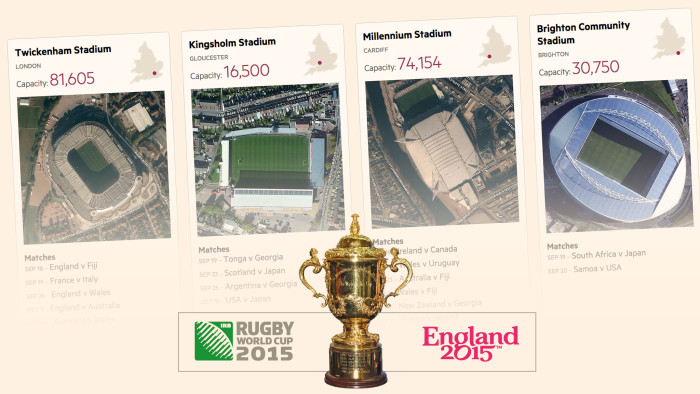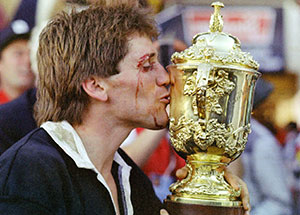How a World Cup pitch paved the way for rugby’s professionalism

Roula Khalaf, Editor of the FT, selects her favourite stories in this weekly newsletter.
Rugby union came late to World Cups. While football started in 1930, rugby league in 1954 and cricket in 1975, it was not until 1987 that union came round to the idea of deciding its global champion through a tournament.
A proposal for a World Cup was rejected by the International Rugby Board without discussion in 1968, and it was not until the 1980s that the idea — driven by New Zealand, Australia and France — was taken seriously. Even then it took individual delegates from England and Wales to defy instructions from their unions to get the idea through the IRB.
One of those rebels was probably John Kendall-Carpenter, the former England captain who became the first tournament chairman. He purchased and named the Webb Ellis Cup, thus enshrining the myth surrounding the game’s origin and William Webb Ellis (Australians today usually call the trophy ‘Bill’).
The delay, and those mandates from the home unions, were rooted in fears that a World Cup would undermine the game’s ideological commitment to amateurism. Whatever one thinks of those values, it is hard to fault the reasoning.
It took only eight years for diehard fears of professionalism to be borne out, with the last amateur event staged in 1995.
Since its low-key launch in 1987, the World Cup has grown to such a level that it now claims to be the world’s third-largest sporting event. It has been remarkably stable in both structure and participation. Sixteen teams took part in 1987 and there will be 20 this year. Hosting has alternated between the southern and northern hemispheres. The south has dominated on the field, producing six of the seven winners — Australia won both previous British-hosted Cups in 1991 and 1999 — and generally hosting the more memorable tournaments.
The FT’s guide to the 2015 Rugby World Cup

The big men are back. The world’s best 620 players (minus the infirm and overlooked) have assembled across England and Wales to contest the eighth world championship. View our interactive guide.
Read more
Of the 20 teams playing in England this autumn only one, Uruguay, was not present in New Zealand in 2011. Exactly the same 20 played in Australia in 2003 and only 25 have ever made the finals.
No team from outside the Foundation Eight (the British and Irish quartet, France, New Zealand, South Africa and Australia) has made it to the final, with the Argentinian team in 2007 the only outsiders to reach the final four. Rugby’s rigid hierarchies have meant that shocks are few and are as likely to happen among the elite (such as France’s upsetting of New Zealand in 1999 and 2007) as between them and the rest, where Wales’s periodic embarrassments by Pacific islanders stand out.
Key Dates
1987
Australia and New Zealand: All Blacks irresistible in first tournament

This was the first World Cup. New Zealand and Australia co-hosted the tournament. The latter staged the best match, an epic semi-final which they lost to France, and was party to the worst, a grim quarter-final in which Wales performed slightly less badly than England.
But those contests were a sideshow compared with the action in New Zealand. The All Blacks swept irresistibly to the title, their remorseless driving power summed up by Scotland captain Colin Deans after his team held them for an hour — significantly longer than anyone else — before succumbing in the quarter-final: “We tackled and tackled and tackled, until we couldn’t tackle any more. And still they came at us.”
With rugby boldly — if a touch reluctantly — going where it had not gone before, it was fitting that the trophy was handed to a Captain Kirk — David of that ilk, leading New Zealand — after a comprehensive final defeat of France. The game would never be the same again.
1995
South Africa: Mandela stars as professional game takes command
We all have mental images of World Cups, their vividness largely related to the exploits and mishaps of our own teams. One, however, is universal. It is the end of the 1995 final at Ellis Park, Johannesburg, featuring a young white man and an older black one in identical green South Africa shirts.

The sight of Nelson Mandela and victorious Springbok captain Francois Pienaar was not only a reflection of Mandela’s genius for political theatre, but a lasting symbolic image for the transformation that South Africa had begun with his election as president in the first post-apartheid polls a year earlier. It was the stuff, as Clint Eastwood’s Invictus would show 14 years later, of Hollywood feature films.
Every World Cup is defined by its host, but none to the extent of this one. It was, in many respects, a reckless decision by the game’s authorities to stage the 1995 tournament in South Africa. But, never having fully understood why apartheid had caused such colossal revulsion (during that era the game’s relationship with the system was, in the most favourable interpretation, complicit) they were keen to readmit one of rugby’s traditional powers at the earliest opportunity.
It was their singular good fortune that the outcome was so happy, although not every memory is a good one. There was, for instance, the horror of the injury to Ivory Coast winger Max Brito, rendered paraplegic by an injury against Tonga.
South Africa’s progress had a sense of predestination about it. When Chester Williams — a black winger important in both playing and symbolic terms — was ruled out with injury, tournament rules enabled his return after another player was sent off.

They may be the only tournament winners to have defeated a superior team. New Zealand’s march to the final had peaked with the semi-final demolition of a good England side, with massive winger Jonah Lomu scoring four times.
New Zealand took their defeat in the final at Johannesburg, 15-12 after extra time, with singular grace. Perhaps they understood that they had run into opponents who played, Pienaar most of all, as if impelled by the forces of history.
Nor was that this year’s only concession to the inevitable. This was the last World Cup whose players were at least nominally amateur. The practical coup de grâce to the game’s ruling ideology — one maintained in its final years by such contortions that a report commissioned by the International Rugby Board accused every leading country except Argentina of deceit and hypocrisy — was administered on the eve of the final when Rupert Murdoch’s News Corporation announced the creation of the Super Rugby competitions for the three great southern powers, New Zealand, South Africa and Australia. Formal acceptance came at the end of August, 100 years almost to the day since the split with rugby league.
2003
Australia: England score a first for Europe
If you are English, this is the one you remember: Jonny Wilkinson’s winning extra-time drop goal, Martin Johnson brandishing the trophy and Australian Premier John Howard distributing the medals with ill-concealed bad grace.
It was an exceptional achievement in every sense. England, the only European winners to date, beat the hosts and Cup holders on their own turf in the final. They are arguably the only team to have won in decline — albeit from an incredibly high peak reached earlier the same year.
That it rained on the semi-final and final did England’s chances no harm, but this was a team equipped for most climates and eventualities. The traditional English virtues of a tough veteran pack and Wilkinson’s ultra-cool, slightly conservative judgment were given a leavening of flair by the imaginative coaching of Clive Woodward and the creative brilliance of Will Greenwood and Jason Robinson.
2011
New Zealand: The hosts labour to lay their ghosts

Host New Zealand promised ‘a stadium of four million’, making this perhaps the best-attended exorcism in history. The ghosts of World Cups past were finally laid to rest, but not without much angst.
The final in Auckland pitched the All Blacks against their most feared opponent, France. Of their two supreme champions Dan Carter was absent injured and Richie McCaw operating at reduced capacity. It took a penalty by fourth choice outside-half Stephen Donald to scrape an 8-7 victory. New Zealand were lucky to win the match, but certainly deserved the tournament.
Earlier Wales’s best-ever effort had been thwarted in the semi-finals by letter-of-the-law refereeing, while England crashed out in the quarters pursued by ugly headlines and the belated realisation that trying to turn former captain Martin Johnson into a coach without any prior experience was a doomed experiment.
1919: The King’s Cup
Rugby Union’s World Cup may have been a late starter, but it had a forerunner at the end of the first world war. Inspired by the presence of Empire troops in and around Britain, the King’s Cup was played by teams from the four dominions — New Zealand, South Africa, Australia and Canada — plus the recently formed Royal Air Force and the British Army, known as the Mother Country.
Service outweighed nationality. So airman Herbie Taylor, one of South Africa’s greatest cricketers, played alongside future England giant Wavell Wakefield for the RAF rather than for South Africa.
Each team played the other once in matches spread across Britain. No final was scheduled, but one materialised when the previously unstoppable New Zealanders lost their last match 6-5 to Australia at Bradford. The All Blacks and the Mother Country thus tied on four wins each. The two met at Twickenham on April 16 1919, and a New Zealand team including one officer and 14 other ranks defeated the Mother Country, which had 14 officers, including a future Bishop of St Asaph and St David’s, 9-3.
New Zealand, who included six former and six future All Blacks, beat French Armed Forces 19-3 in a challenge match on April 19 and a full Welsh national team 6-3 on the 21st.
This proto-World Cup inspired another, less happy precedent. Enthused by their first direct contact with New Zealand rugby, South Africa invited NZ Forces to visit on the way home, but asked them to omit their two non-white players, Ranji Wilson and Parekura Tureia. New Zealand complied, setting a miserable legacy that still haunted rugby in 1987.
Comments